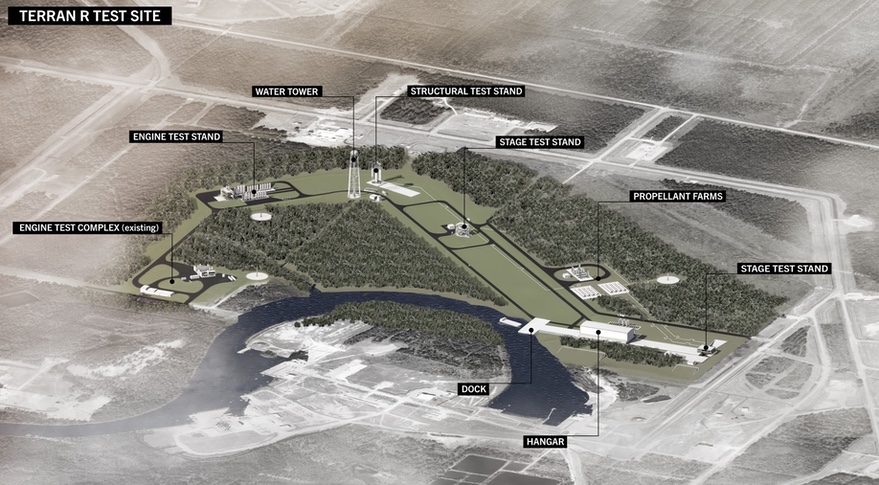WASHINGTON — Launch vehicle developer Relativity Space will expand its engine test site at NASA’s Stennis Space Center, the second company in as many months to announce new or expanded facilities there.
Relativity said Oct. 18 it will build test stands, office buildings and a vehicle hangar on more than 150 acres of land at the Mississippi center. Those facilities will be used for testing of its Aeon R engine for its Terran R reusable launch vehicle starting in late 2023.
Relativity uses several existing test sites at Stennis, either through exclusive-use agreements or reimbursable Space Act Agreements, for testing the Aeon 1 engine for its Terran 1 small launch vehicle or the Aeon R. The Terran 1 is expected to make its first orbital launch attempt before the end of the year while the Terran R is scheduled to make its debut no earlier than 2024.
“We’re honored to partner with NASA and are grateful for their support,” Tim Ellis, chief executive of Relativity, said in a statement. “We look forward to growing our Stennis-based team, who will be pivotal in our success of meeting many more first-ever milestones as we scale our Terran R program.”
“NASA is committed to working with commercial companies to help them achieve their space goals, and Stennis is a proven leader in enabling such partnerships. Since their arrival in the spring of 2018, Relativity Space has continued to grow as a respected member of the Stennis federal city,” Rick Gilbrech, director of Stennis, said in a statement.
Relativity is one of several launch companies in recent years that signed agreements to use test stands at Stennis that, in some cases, had been dormant for years. Relativity’s expansion comes less than a month after Rocket Lab announced it would test the Archimedes engines it is developing for its Neutron rocket at the A-3 test stand at Stennis.
Rocket Lab said Sept. 21 it signed a 10-year agreement to use that test stand, which had been mothballed for years after being used to test the J-2X engine developed for NASA’s Constellation program. The agreement includes an option to extend the agreement for 10 more years.
“By being in the Stennis facility, we can leverage a lot of their site-wide infrastructure for power systems, transport network, commodity and supply chains; all the little things that make a test site run and tick,” Shaun D’Mello, vice president of launch systems at Rocket Lab, said at the company’s investor day event Sept. 21.
He said the company would start work soon to modify the test site to support Archimedes, using a “generous capital incentive” offered by the Mississippi Development Authority, the state’s economic development agency. Modifying the A-3 test stand will allow the company to start using it in a matter of months, he said, rather than the years that might be required to build a new test facility.
“Creating a test complex from scratch to the scale and complexity needed to test and develop Archimedes would have had an inconceivably long lead time, so the fact that we’ve secured Stennis and can leverage its existing infrastructure and test stand puts us on the fast-track to Neutron’s first launch,” said Peter Beck, chief executive of Rocket Lab.
